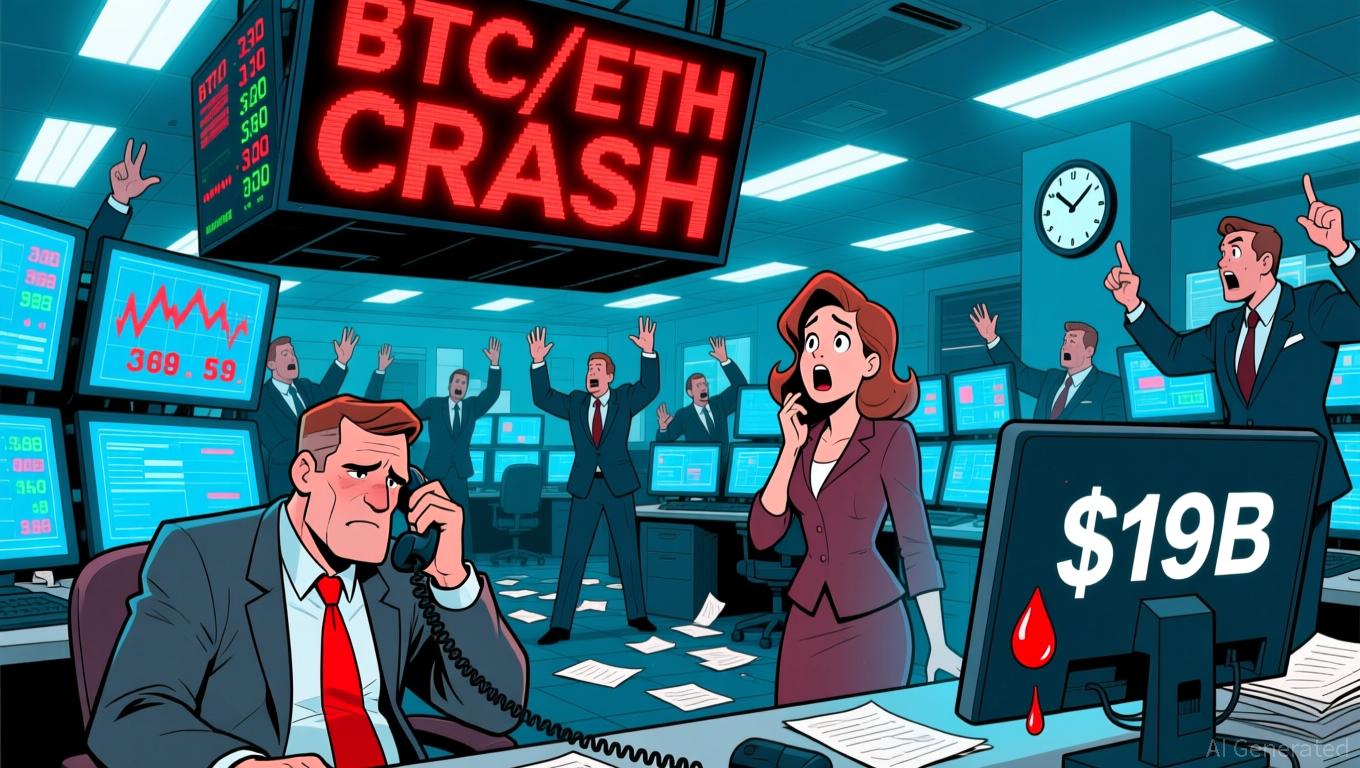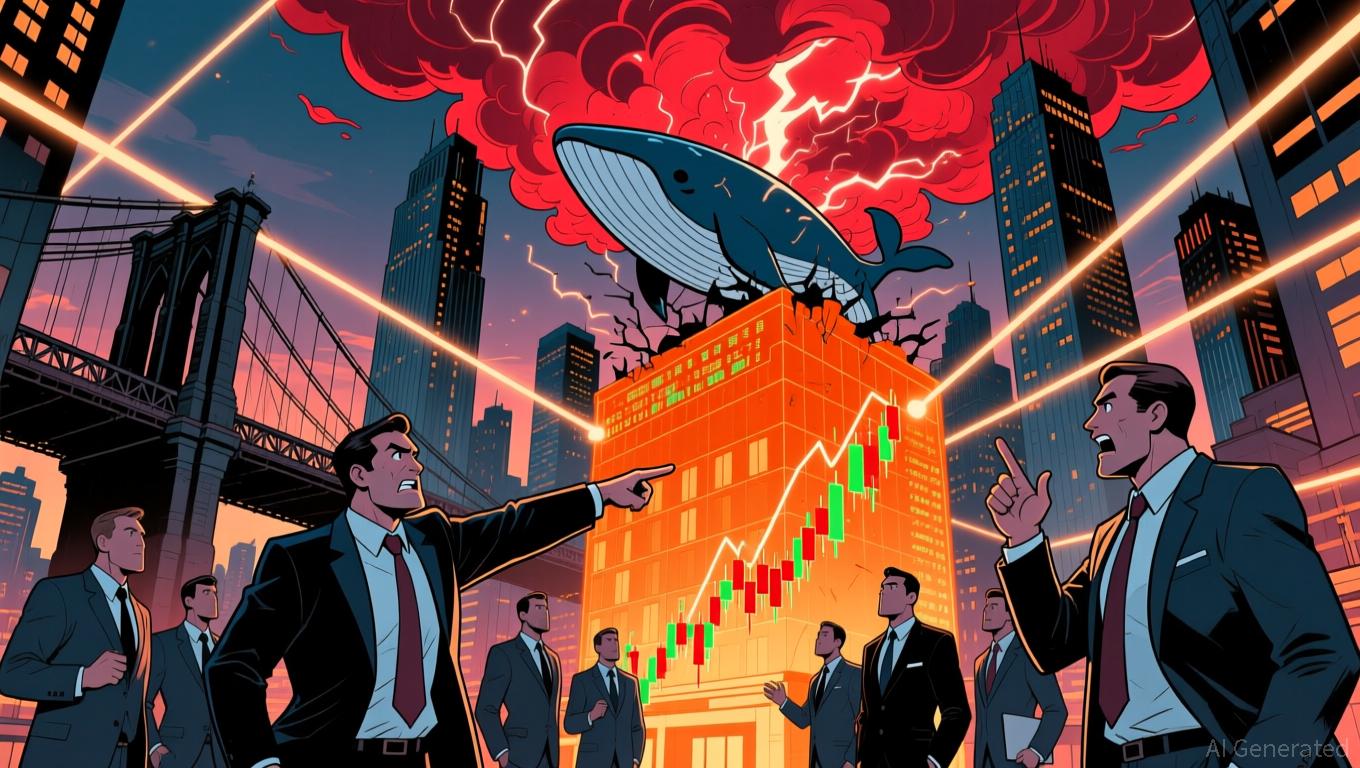Trump’s Wall Street Fundraiser Sparks Renewed Debate Over Deregulation and Regulatory Oversight Following Trade Finance Crisis
- Trump dined with Wall Street leaders amid First Brands' $3B trade finance collapse, exposing non-bank lending risks and triggering calls for stricter oversight. - Jefferies faces scrutiny over $3B in tied debt as its stock fell 19%, while JPMorgan's Dimon warned of systemic gaps in non-bank lending oversight. - Trump's 50-year mortgage proposal sparked debate, with critics fearing "debt for life," while a 42-day government shutdown worsened market uncertainty. - The administration's deregulatory agenda c
On November 10, 2025, President Donald Trump held a prominent dinner with leading Wall Street figures, including the CEOs of
First Brands' bankruptcy in September—triggering more than $3 billion in trade finance liabilities—has highlighted weaknesses in non-bank lending and raised concerns about the thoroughness of Wall Street’s risk assessments. The Cleveland-based firm, formerly known as Trico Products, was heavily dependent on factoring and supply-chain financing to support its aggressive acquisition plans.
This turmoil has reignited discussions about the dangers of private credit, with
Meanwhile, the Trump administration has unveiled a proposal for 50-year mortgages as a way to tackle housing affordability issues.
The administration’s policy agenda is also being tested by recent market turbulence. The 42-day government shutdown—the longest in American history—ended on November 11 after a bipartisan deal restored funding for federal agencies and provided back pay to 900,000 furloughed employees.
Trump’s dinner with financial industry leaders took place amid this climate of market uncertainty. Although the specifics of the conversation have not been made public, the event highlights the administration’s efforts to balance deregulation with initiatives to stabilize critical sectors.
As the administration works through these issues, its ability to coordinate with Wall Street on housing and financial reforms will play a key role in shaping investor confidence in the months ahead.
Disclaimer: The content of this article solely reflects the author's opinion and does not represent the platform in any capacity. This article is not intended to serve as a reference for making investment decisions.
You may also like
Post-FTX digital asset exchanges simplify futures offerings to comply with regulatory requirements
- Binance delisted RUNEUSD futures to align with post-FTX regulatory demands and evolving user preferences. - The move follows industry-wide transparency efforts like proof-of-reserves initiatives after FTX's 2022 collapse. - Post-FTX trends show growing demand for DeFi solutions and institutional-grade crypto products with enhanced compliance. - Challenges persist in balancing innovation with regulation as exchanges like Binance recalibrate strategies amid shifting market dynamics.

Polygon and R25 Tackle DeFi Transparency Issues with rcUSD+ Yield Token Designed for Institutional Use
- Polygon partners with R25 to launch rcUSD+, a yield-bearing stablecoin backed by real-world assets like money market funds. - The token generates institutional-grade returns through low-risk investments, addressing DeFi's opacity with transparent asset verification. - rcUSD+ serves as a collateral layer for Polygon-based apps, enabling developers to build RWA-linked DeFi instruments with standardized yield generation. - The integration aligns with rising institutional demand for tokenized assets, leverag

Bitcoin Updates Today: Crypto's 2025 Slump: Hopefulness Versus Ongoing Vulnerability
- The 2025 crypto bear market, marked by a $19B liquidation event, is deemed calmer than 2022’s collapses due to stable DeFi and no major institutional failures. - Trump’s 100% China tariff and export threats triggered sharp price drops, but Haseeb Qureshi highlights improved fundamentals and resilient infrastructure. - Critics like YQ question sustainability, citing weak small-cap liquidity and speculative assets, while Bloomberg notes bearish ETF flows and reduced institutional activity. - Macroeconomic

Ethereum News Update: Major Ethereum Holders Resist Market Decline: Leveraged Purchases Indicate Strong Belief in Price Floor
- Ethereum whales accumulate $1.33B ETH via leveraged DeFi tools like Aave amid market uncertainty. - Whale buying absorbs liquidity and reinforces support zones, countering ETF outflows and retail liquidations. - Upcoming Fusaka upgrade (Dec) aims to boost scalability, potentially driving revaluation post-volatility. - Mixed technical indicators show oversold RSI but bearish MACD, with key support at $3,250-$3,131. - Analysts debate whale accumulation's impact: some see bottom signals, others warn of leve
